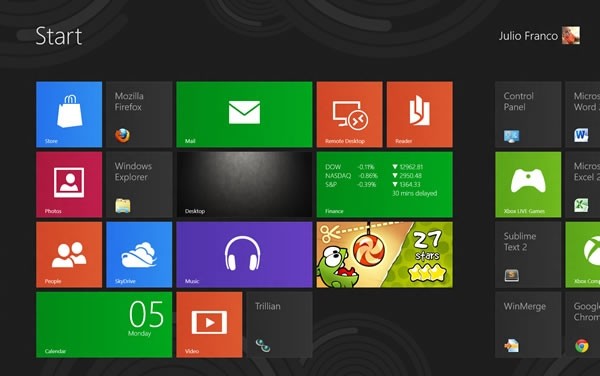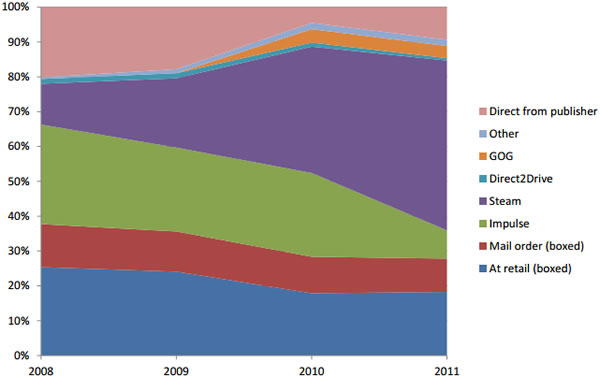Stardock has released its Customer Report 2011 (PDF), addressing questions, concerns and complaints about the company's projects over the last year and beyond. Before delving into other topics, the firm felt it was necessary to clear the air on its sale of Impulse to GameStop last May. Although the acquisition brought criticism from some loyal users, Stardock essentially quit digital distribution while it was ahead.
On Impulse
Impulse was growing at an exceptional rate, doubling in size over the previous year and on its way to doubling again. Although that would normally be welcomed, Stardock said the distribution unit was consuming the rest of the company, which is relatively small (35+ employees as of last May, if Wikipedia is accurate). Impulse was sapping talent from the company's two other business units dedicated to apps and games.

Stardock noted that the effects of this manifested in the company's flagship software, Object Desktop, as well as the game Element: War of Magic ({pf id:2060 size:small}), which launched in August 2010 with mostly unfavorable reviews. Besides hindering the quality of its other products, the nature of running a large digital store conflicted with Stardock's internal culture, which is less about bean counting and more about making "cool stuff."
Lastly, the company's entertainment unit simply wanted the ability to release titles on Steam and other rival platforms. This desire has been fulfilled with several games appearing on Valve's service through November and December 2011, including Sins of Solar Empire: Trinity, Galactic Civilizations II: Ultimate Edition and Demigod. We assume Elemental: Fallen Enchantress will also appear on Steam when it arrives this fall.
Moving Forward
Stardock is lauding Fallen Enchantress as a prime example of what it can accomplish without the extra baggage of Impulse. The outfit has learned from technical and design problems with Elemental: War of Magic and it is "essentially starting over" with its latest project. The company believes it's on the path to delivering the "marquee turn-based strategy game of its time period" that is ranked among titans like Civilization IV.
The company has various (non-game) software products in the pipeline too. As early as this spring, it plans to ship a rewritten build of "WindowsFX," which has enhancements for resizing, moving, animating and focusing on windows. The developer also recently released "Tiles," a Metro-like sidebar interface for pre-Windows 8 OSes, as well as "Start8," which returns the traditional Start menu to Windows 8's revamped taskbar.
Looking into its crystal ball, Stardock says we're approaching "decoupled computing," where computing devices are wirelessly connected to I/O devices (such as keyboards, mice and gamepads as well as displays and speakers). The company believes this might emerge via Apple's AirPlay and Intel's WiDi standards, and although it won't drastically alter users' experiences, it will "radically" change the development side of things.
Doubting Windows 8
Windows 8 is a fine illustration of the ongoing convergences, as it is designed to serve everything from tablets to workstations. Stardock is worried that Windows 8 will bomb, which is concerning because the outfit's primary revenue comes from Windows-based software. "Our success relies heavily on the success of Windows," the company wrote. It believes Microsoft's next OS will fail unless three major changes are made:
- Desktop users must be able to use Windows 8 entirely as a desktop OS without shifting back and forth between Metro.
- Metro needs improved app organization functionality instead of expecting users to type search queries for hidden tiles.
- A complete shift away from the current mouse-over feature discovery back to visual discovery -- a common complaint.
Stardock notes that although there will be plenty of third-party applications to solve Windows 8's shortcomings (heck, there already are), it doesn't believe there is a viable commercial market for such software because many users will avoid upgrading or seek alternative platforms -- I.e. Apple's. The company believes that Windows 8's failure could aid the shift of "decoupled computing" and play into Apple's hands.

"We maintain that the primary threat to the PC (and gaming consoles) comes in the form of Apple’s AirPlay combined with Bluetooth 4.0+ controllers. A Windows 8 failure may buy enough time for Apple to release displays (and get partners to release displays) with embedded AirPlay. The 'computing' will be done on an iPad/iPhone, the keyboard/mouse handled by Bluetooth and the display via AirPlay," the company said.
"While these changes are taking place, the mobile space is exploding. Developers who were once PC developers are migrating in ever greater number to either iOS or Android. And Apple, with AirPlay, is setting itself up to compete head-to-head with the next generation console offerings," the report stressed again. "It is a good time to be a software developer. It’s an even better time to be a software consumer."
User Statistics
The paper concludes with a survey taken by four million people. Of the respondents (who were largely males aged 20-40), an increasing majority rank themselves as "expert" or "power" users. Some 12% don't own a console, while the Xbox 360, PS3 and Wii evenly share the remaining 88%. About half of the users buy games via Steam, while 30% still rely on retail or mail order sales and other digital services split the final 20%.

The number of users who own iPads has more than doubled to about 17% since 2010's survey, while iPhone ownership increased to around 24%. Android devices have also grown more popular, with about 44% of the respondents owning a device using Google's mobile OS -- up from 25% last year. Interestingly, Windows Phone ownership has dropped by more than half, slipping to barely a hair over 5% (nearly tied with Apple TV).
Those ownership stats were mostly mirrored when users asked what platforms they wanted Stardock to develop on. A whopping 31% said Android -- nearly double the amount of any other category. The iPhone and iPad came in second with 17%, followed by the Xbox at 15% and PlayStation at 12%. Only 7% want Stardock to work on OS X or social gaming -- but that's still more than the 6% interested in Wii or Windows Phone apps.